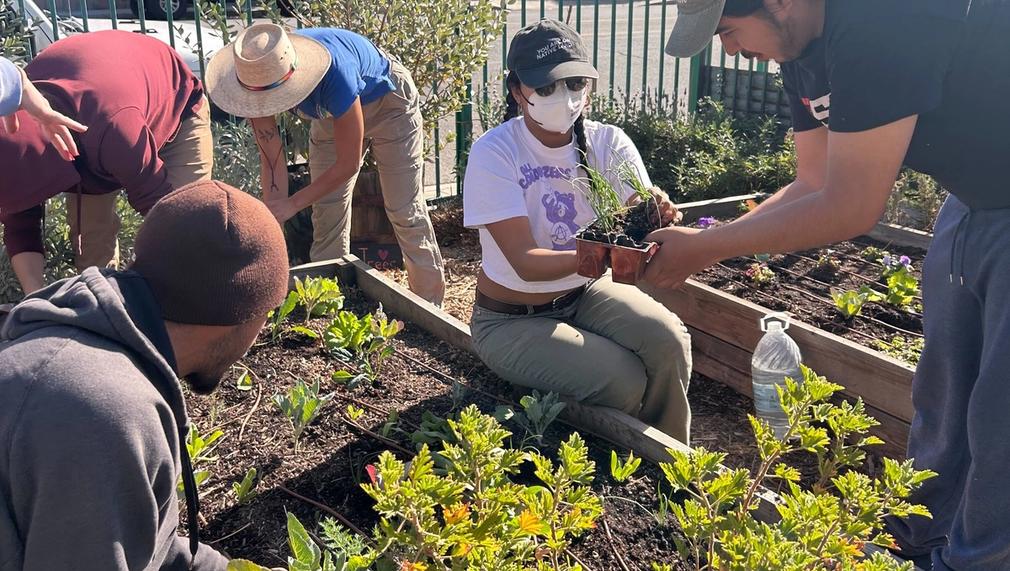Reseda Community Nursery & Eco Hub
Unlike large-scale commercial farms, the Reseda Plant Nursery serves Latinx, Black, immigrant, and low-income families in the community by providing free produce, native plants, and educational workshops. With grant support, we will expand plant cultivation, deepen community engagement, and partner with local organizations to increase equitable access to fresh food and regenerative agriculture, fostering healthier, greener neighborhoods and environmental justice.

What is the primary issue area that your application will impact?
Green space, park access, and trees
In which areas of Los Angeles will you be directly working?
San Fernando Valley
In what stage of innovation is this project, program, or initiative?
Expand existing project, program, or initiative (expanding and continuing ongoing, successful work)
What is your understanding of the issue that you are seeking to address?
Latinx, Black, immigrant, and low-income communities in Reseda face intersecting challenges: limited access to green spaces, heightened exposure to extreme heat, and persistent food insecurity. The San Fernando Valley, including Reseda, experiences some of the highest urban heat island effects in Los Angeles, exacerbated by low tree canopy coverage in these neighborhoods (CalEPA, n.d.; Neighborhood Data for Social Change [NDSC], 2021). In 2023, food insecurity among low-income households in L.A. County surged to 44%, disproportionately impacting Black and Latino residents (USC Public Exchange, 2023). Our Reseda Nursery addresses these disparities by transforming suburban backyards into safe, green spaces that offer free and donation-based produce, native plants, and educational workshops. We aim to expand equitable access to fresh food and regenerative agriculture resources, fostering environmental justice and resilience in the community.
Describe the project, program, or initiative this grant will support to address the issue.
This grant will support the growth and expansion of the Reseda Nursery, a unique backyard-based native plant and food cultivation site serving Latinx, Black, immigrant, and low-income communities in Reseda and Arleta. Unlike traditional commercial farms or community gardens, our nursery transforms suburban spaces into regenerative eco-hubs. We provide free and donation-based native plants, fresh produce, and compost to residents while hosting hands-on educational workshops on sustainable gardening, climate resilience, and environmental justice. With grant funds, we will expand our nursery’s growing capacity with new soil, a chicken coop, native plants, irrigation systems, and nursery infrastructure, including the installation of solar panels, hand washing stations, outdoor sinks, an outdoor kitchen for farm-to-table preparations, and storage sheds. We will offer monthly community workshops led by local experts on regenerative practices and host creative community events; distribute free and donation-based plant starts, compost, and tools to neighborhood residents; and host seasonal community planting days to promote productive and native biodiversity. This will also allow us to strengthen partnerships with schools and organizations to support local food distribution and environmental education.
Describe how Los Angeles County will be different if your work is successful.
Our long-term vision is to replicate our backyard nursery model in other neighborhoods, creating a network of community-run eco-hubs. This model can serve as a scalable template for other communities across Los Angeles, especially in dense urban areas where Latinx, Black, immigrant, and low-income residents often lack access to green space, to transform underused land into thriving, regenerative green spaces. By scaling through partnerships and training, we aim to empower more Angelenos to grow their food, restore biodiversity, and reimagine their neighborhoods from the ground up. SOW Collective envisions an eco-hub in every neighborhood where local food systems support healthy lifestyles, youth have opportunities to work in their community outdoors, and events strengthen community as well as nutrition and environmental education. Enriching the soil and growing nutritious food for the community invites healthy living and provides access where it is needed most.
Approximately how many people will be impacted by this project, program, or initiative?
Direct Impact: 900
Indirect Impact: 3,000